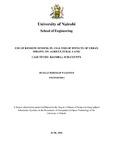Land Library
Welcome to the Land Portal Library. Explore our vast collection of open-access resources (over 74,000) including reports, journal articles, research papers, peer-reviewed publications, legal documents, videos and much more.
/ library resources
Showing items 64 through 72 of 466.There has been progress in terms of legislation of land ownership and women rights on the same subject in Kenya and a number of Non-Governmental Organizations and Civil Society Organizations are in the fore front promoting women land ownership.
Land is in no doubt the most important asset in the lives of Kenyans. It is a factor of production which is core to the economic activities of this country. The advent of settlers and colonialism in East Africa placed land in a high level of importance than before.
Urban Sprawl is the spreading out of a city and its suburbs over more and more rural land at the periphery of an urban area. This involves the conversion of rural land into built up, developed land over time. Sprawl is characterised by one or more existing patterns of development.
This report prepared by FAO explores the challenges and opportunities represented by the complex interrelationship between forests, agriculture and sustainable development.
This is an inderactive portal to help citizrns of Bangalore check if their residence falls on a storm waterdrain.
Communities dependent on climate sensitive livelihood such as agriculture, fishing, horticulture, forestry and livestock have become vulnerable in the light of the climate variability and the challenges arising henceforth.
This report seeks to highlight the potential of FRA, assess its achievements, identify the bottlenecks, and find the ways forward. Its objectives are to:
To understand more about people’s perceptions of the security of property rights, in India and in the rest of the world, we launched a series of surveys. The first survey was carried out with 14,000 respondents in 14 states across India.
The brief focuses on Sustainable Land Management (SLM). Eradicating poverty, reducing inequalities, and advancing inclusive growth are directly linked to how we manage our planet’s terrestrial ecosystems and the goods and services they provide.




